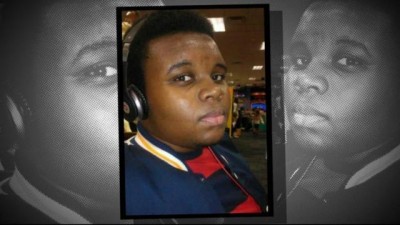Murder in America’s Streets, Why is Michael Brown a Martyr?

Michael Brown is dead. Eighteen years old, a young man gunned down—not just shot–by police in his neighborhood in Ferguson, Missouri.
Brown’s experience earns international attention not because he is dead, but because of sustained outrage, first by his grieving family, then over video available from bystanders, then by people in his community denied answers, then by shocked citizens around the county.
Extrajudicial killing of Black Americans, especially our young men, is common today. Many pass unnoticed. So, why the attention to this murder?
First, police refused to permit anyone near Brown’s body lying in the street. That ban included the boy’s own mother. She was turned back by the police, the lifeless body of her child in sight.
Second, residents alerted the media that Brown was lying in the road, guarded by police for more than four hours. No medics arrived to attend him.
Third, a companion of Brown during the confrontation with the killer policeman testified Brown was unarmed, with his hands up in surrender when he was murdered.
Fourth, the community’s call for explanations of the killing went unanswered. For almost a week, Ferguson police chief refused to release the name of the officer who’d killed Brown (with 6 gunshots!). Finally when public outrage grew and civic protests began, reinforced police arrived to repel them armed with assault rifles and armored vehicles. They placed snipers around the area and deployed rubber bullets and tear gas against peaceful demonstrators. Journalists were among those mistreated by police and arrested. This wasn’t Gaza or Baghdad; this was hometown, USA.
As protests continue you’ll hear leaders shout, “Thank you Michael Brown”. Brown is a martyr. Civil rights leader Jesse Jackson remarked on the killing of another young Black American, Trayvon Martin in 2012, “We find our way from the light that comes from the martyr.” Many associate Brown’s fate with too many other killings here (http://time.com/3136685/travyon-sybrina-fulton-ferguson/). A quiescent people become mobilized.
Why do we view Michael Brown as a martyr? Because his death serves to expose these routine American injustices:– shooting Black unarmed citizens, unreasonable suspicion of Black and Brown people; disrespecting the dead and their families (perhaps the way US troops do in Afghanistan and Iraq). Our authorities exhibit fear and violence rather than empathy and patience. (Perhaps many of these policemen are veterans who shot their way through Iraqi and Afghan villages). Finally this incident confronts us with how shamelessly warlike our community policing is. We’re accustomed to watching such images in movies and in news coverage of foreign wars. Now we understand how widespread military tactics are across the USA.
Although they’re rarely telecast so widely. Normally hidden from public scrutiny, they’re confined to minority neighborhoods and to suspect immigrants. ‘Swat’ teams regularly charge into American homes, rifles ready, to arrest mainly Black citizens. Muslim Americans too experienced this. Abuse of young Black people by police is endemic; detention often goes unchallenged. Multiple shots fired at an unarmed suspect is not new.
Why is Michael Brown a martyr? Because his death helped to bring these everyday injustices to the fore. Because his death became a national spectacle. Because his death rightfully shames USA. Brown’s death says: this is what American is; it challenges the leadership to prove otherwise. His death is a not just a legal matter; it’s a moral issue we cannot turn away from.
Thank you Michael Brown.

